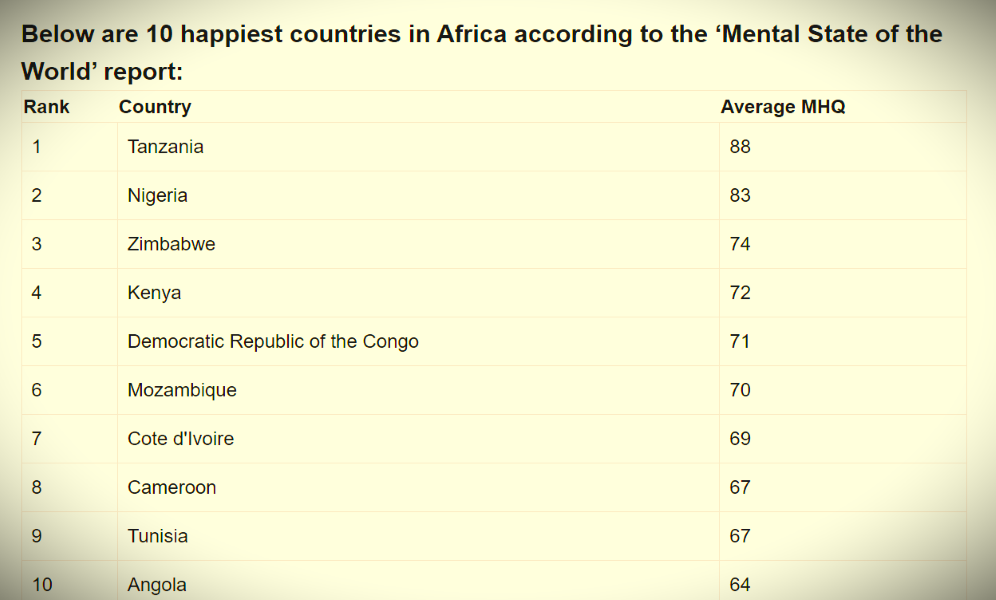Tanzania is topping the list of happiest countries in Africa as of the latest findings from the ‘Mental State of the World’ report 2024.
Tanzania has amassed the highest score at 88, followed by Nigeria with 83 and Zimbabwe which gets 74 and Kenya at Number 4 with 72 points on the MHQ, latest ranking.
The Global Mind Project’s fourth annual ‘Mental State of the World’ report, conducted by Sapien Labs, suggests a global decrease in mental well-being since the onset of the pandemic.
Tanzania was one of the few countries that did not go into lockdown during the global Covid-19 pandemic.
The report compiles responses from over 500,000 individuals gathered throughout the year across 71 countries, covering 9 geographic regions including Africa.

The Mental State of the World report is the annual report of the Global Mind Project, an ongoing, comprehensive survey of the mental wellbeing of the Internet-enabled world.
The objective of the Global Mind Project is to provide an evolving global map of mental wellbeing and enable deep insights into its drivers that can be used for more effective management of population mental wellbeing through evidence-based social policy and interventions.
The year 2023 marked the fourth instalment of the project which kicked off in 2021.
The latest report consolidates responses from over 500,000 individuals collected during the year across 71 countries spanning nine geographic regions (Core Anglosphere, Western and Eastern Europe, Latin America, Central, South and Southeast Asia and West and North Africa).
It includes 13 languages that are English, Spanish, French, Arabic, Portuguese (European and Brazilian), German, Swahili, Hindi, Italian, Russian, Hebrew and (Simplified) Chinese. This includes an additional 7 countries and 4 new languages compared to 2022.
As of October 2023, there were 5.3 billion active Internet users worldwide, representing 65.7 percent of the global population.
In countries like the United States where Internet penetration is more than 90 percent the Global Mind data is closely representative of the general population and aligns with national census trends.
However, this is not so for countries in Asia and Africa where the Internet-enabled population are typically a minority and generally represent higher socioeconomic groups or those who have achieved greater levels of education.
Trends reported here are not likely to be reflective of offline populations who typically live in a different context and therefore country level trends may differ substantially from the Global Mind trends.
Measuring mental wellbeing
This Global Mind project aligns with the World Health Organization (WHO) definition of mental wellbeing which is broadly the ability of an individual to handle the normal stresses and adversities of life and contribute productively to society.
The project therefore does not inform on traditional views of happiness or life satisfaction but rather provides a more comprehensive and economically relevant perspective across the breadth of emotional, social and cognitive capabilities.




Comments are closed, but trackbacks and pingbacks are open.